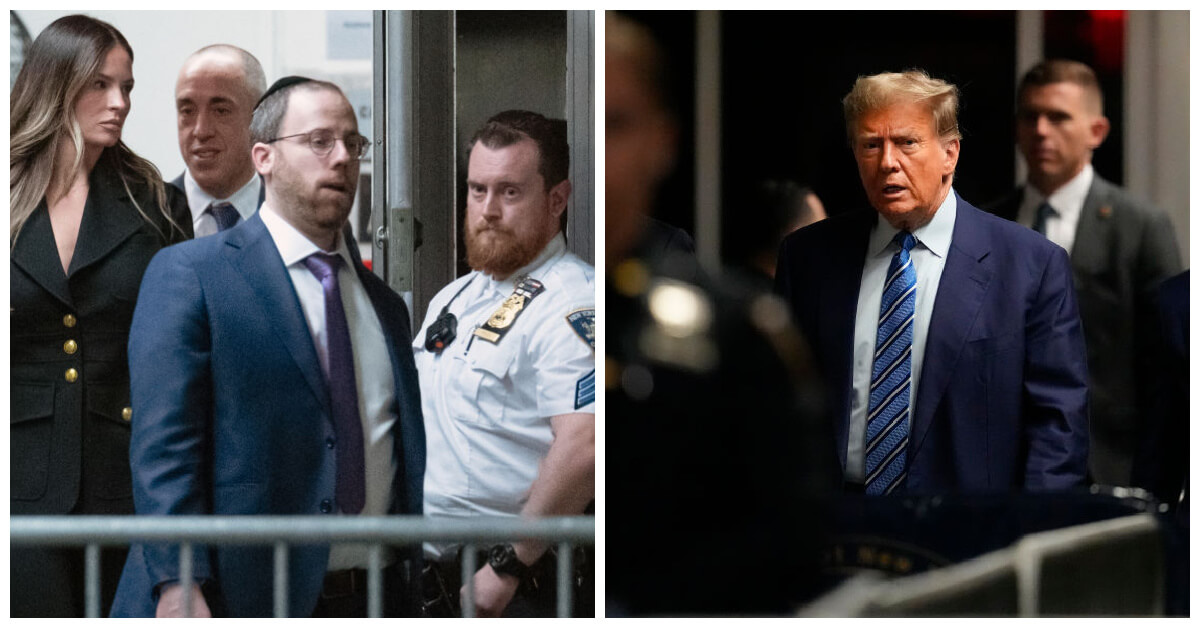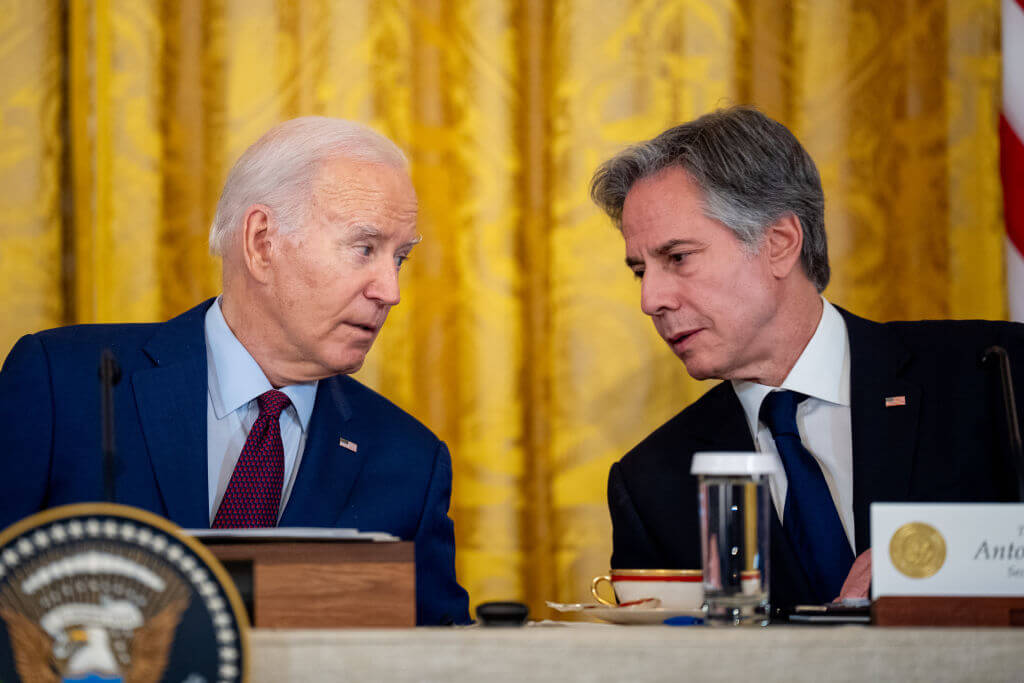White House Okays Hamas Candidates
WASHINGTON — The Bush administration has agreed to the unconditional participation of Hamas candidates in the upcoming Palestinian elections, despite strong opposition from Israeli officials, Congressional leaders and Jewish organizations.
Contrary to recent press reports, the administration is not insisting that Palestinian candidates — including Hamas representatives — be required to sign a pledge embracing democracy or disavowing violence, American and Palestinian sources said, following the White House meeting last week between President Bush and Palestinian Authority President Mahmoud Abbas.
According to multiple American and Palestinian sources, Bush agreed with Abbas’s argument that posing any conditions to the participation of Palestinian candidates in the January 2006 elections would do more harm than good in attempting to strengthen Palestinian moderates. Bush has also reportedly accepted the P.A. leader’s argument that his police forces are in no position at this time to disarm Hamas.
On both issues, Bush appeared to side with Abbas over the objections of Israeli officials, who have been pushing for a Palestinian crackdown on Hamas.
“I explained [to Bush] that we have a democracy and that movements of all political colors must be allowed to participate in the elections,” Abbas reportedly told the Agence France-Presse, adding, “I think I succeeded in getting my argument across to the president, to [Secretary of State] Condoleezza Rice and to Congress.”
In recent days, after it became clear that the White House was siding with the P.A., Jerusalem appeared to be backing down. But congressional staffers and Jewish activists said that the White House’s decision to accommodate Hamas could lead to a confrontation with Capitol Hill lawmakers and the Jewish community at some point in the next two months before Palestinians go to the polls in January.
Last week, as Abbas was meeting with Bush in the Oval Office, Jewish communal leaders held a conference call and agreed that Hamas candidates should be banned from running unless the terrorist organization disarms and rejects violence, according to Martin Raffel, associate executive director of the Jewish Council for Public Affairs. The council is a consultative public policy group that brings together 123 local Jewish communities and 13 national Jewish organizations. Raffel said that participants in the conference call, which was organized by the JCPA, “totally embraced the Israeli position” that Hamas needed to disarm and repudiate its antisemitic ideology and past calls for Israel’s destruction before being allowed to participate in the Israeli elections.
“There was no receptivity to the line of argument proposed by Abbas that the election comes first and then the disarming and the rejection of this antisemitic racist ideology,” Raffel said.
Raffel said he was unhappy with what could be interpreted as the administration’s de facto legitimization of Hamas as a political force. He stopped short of predicting a confrontation with the administration. But another official with a Jewish organization, speaking on condition of anonymity, said that eventually the administration’s position could trigger an angry reaction from many Jewish activists and organizations.
American Jews, the official said, view Hamas not only as a terrorist group but also as a virulently antisemitic group that ought not to be legitimized.
Lawmakers could end up protesting the Bush administration’s position, congressional aides said. On October 20, Abbas met with Bush. That same day, 50 members of the House of Representatives, including the full Democratic and Republican leadership, sent Abbas a letter urging him to take action against Hamas before the January elections.
“Any requirements for groups to disarm or disavow racist ideologies must be made prior to participating in an election,” the letter stated. “If not, and if members of Hamas are elected to positions of influence within the Palestinian Authority, relations with the United States may well be seriously damaged.”
The message to Abbas was clear, a congressional aide said. “If getting Congress to approve financial aid to the Palestinians had been difficult so far,” the aide said, “imagine how hard it would be with Hamas elected to your governing institutions.”
The Bush administration has been agonizing for months over what America’s policy should be on Hamas’s participation in the upcoming parliamentary elections. “We are all struggling with it. It’s tricky,” a senior State Department official told a group of Israeli reporters last week at a briefing following the Bush-Abbas meeting.
On the one hand, administration officials accept the Israeli position that a terrorist organization such as Hamas should be disbanded rather than legitimized by becoming part of the political system. Bush and Secretary of State Condoleezza Rice, as well as other senior administration officials, have stated as much publicly. On the other hand, the Bush administration has been sympathetic for months to Abbas’s argument that banning Hamas from running would just strengthen the militant group, delegitimize the election process and weaken Abbas.
A month ago, a senior administration official told the Forward that the White House was trying to work out a formula that would satisfy both Israeli and Palestinian concerns. American diplomats suggested to Abbas that every candidate running for a seat in the legislative council be required to sign a pledge disavowing violence. As legal basis for the requirement, the administration suggested a clause in the 1995 Israeli-Palestinian Interim Agreements, which ban the participation in Palestinian elections of parties or individuals who “commit or advocate racism” or “pursue the implementation of their aims by unlawful nondemocratic means.” Also suggested was an article in the Palestinian 1995 election law, which requires parties registering for elections to forswear racism. American and Palestinian sources said that Abbas and his aides pointed out that they don’t see the Oslo-era requirements as applicable at this time, and that recently a new law that has no such requirement replaced the 1995 election law.
According to Americans and Palestinians who spoke with the P.A. president before and after his meeting at the White House, Abbas offered several other arguments for his position.
Abbas argued that he deserved a fair chance to defeat Hamas at the polls, and he predicted that Hamas-affiliated candidates who get elected most likely would join the opposition in the Palestinian parliament, allaying any concern from the United States about a Palestinian government that includes Hamas leaders. Abbas also insisted that, after elections and the convening of a new legislative council, the P.A. would be in a stronger position to introduce legislation that bans violence. This would lay the legal foundation for disarming militants and fighting terrorists. Such legislation, adopted by a parliament that includes representatives of Hamas, would make counter-terrorism enforcement much easier, Abbas argued. He also reportedly vowed to start disarming militias affiliated within his own Fatah movement before the elections, including the Al-Aqsa brigades, which have claimed credit for dozens of attacks on Israelis. On Sunday, P.A. Prime Minister Ahmed Qurei officially announced a plan to disarm these groups “within weeks,” mainly by training them and incorporating them into the Palestinian security services.
Bush and his aides grudgingly accepted these Abbas arguments, sources said, but they made clear to Abbas that their acquiescing to Hamas’s participation in the electoral process should not be misinterpreted as legitimizing Hamas or as dropping the demand that Hamas be disarmed. The administration’s official line is that it is not up to America to dictate how Palestinians conduct their elections. “How the political process unfolds for Palestinian elections is up to the Palestinians to decide,” said C. David Welch, assistant secretary of state for Near Eastern Affairs, in a briefing with reporters a day after the meeting at the White House.
“We have a concern about the activities of armed groups or militias and their participation in the democratic process,” Welch said. “We believe there’s a contradiction there, that this contradiction must be addressed. How it is addressed is up to President Abbas and the Palestinian people.”
Israel, which has said that it would not assist an election campaign in which Hamas takes part, voiced disappointment over America’s position.
“I can’t tell you that we are happy with this, but we have made our position clear,” an Israeli diplomat said.
But the diplomat noted that Jerusalem and Washington still see eye to eye on several important issues, including Jerusalem’s insistence that there be no arbitrary deadline for Palestinian statehood.
Bush indicated as much last week, when he was asked if he still was aiming for the creation of a Palestinian state by the end of his second term. The president implied that Palestinian anti-terrorism measures are a condition for progress. Israeli diplomats said that, according to American officials, the White House told Abbas that the situation is not yet ripe for the open or secret final-status negotiations for which the Palestinian leader is pushing.

I hope you appreciated this article. Before you go, I’d like to ask you to please support the Forward’s award-winning journalism this Passover.
In this age of misinformation, our work is needed like never before. We report on the news that matters most to American Jews, driven by truth, not ideology.
At a time when newsrooms are closing or cutting back, the Forward has removed its paywall. That means for the first time in our 126-year history, Forward journalism is free to everyone, everywhere. With an ongoing war, rising antisemitism, and a flood of disinformation that may affect the upcoming election, we believe that free and open access to Jewish journalism is imperative.
Readers like you make it all possible. Right now, we’re in the middle of our Passover Pledge Drive and we need 500 people to step up and make a gift to sustain our trustworthy, independent journalism.
Make a gift of any size and become a Forward member today. You’ll support our mission to tell the American Jewish story fully and fairly.
— Rachel Fishman Feddersen, Publisher and CEO
Join our mission to tell the Jewish story fully and fairly.
Our Goal: 500 gifts during our Passover Pledge Drive!
























